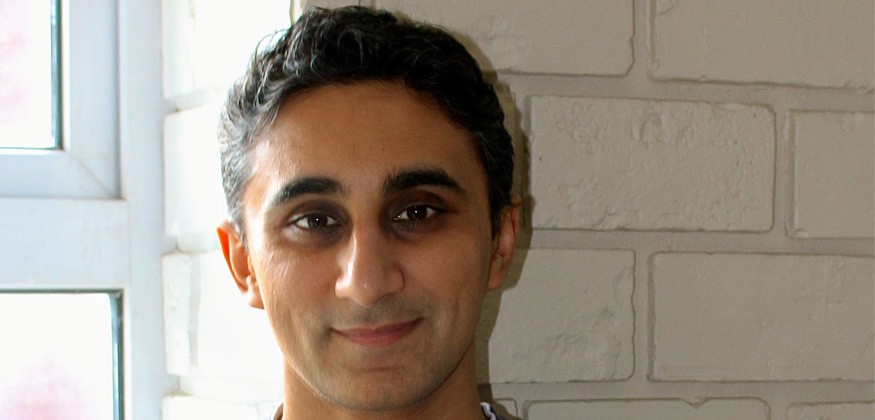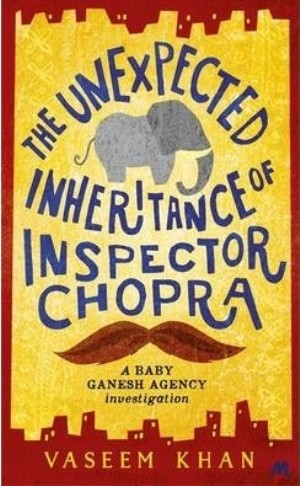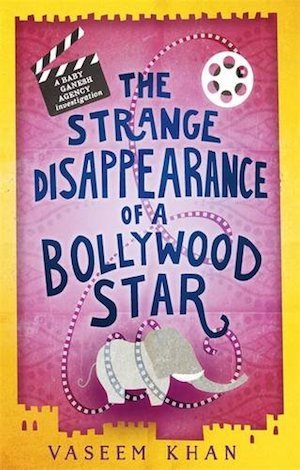 If you like your crime with a touch of spice – literally – then Vaseem Khan’s Baby Ganesh Agency series, featuring Inspector Chopra and his little elephant Ganesha, should fit the bill. Book three, The Strange Disappearance of a Bollywood Star, goes behind the glamour and glitz of the movie industry and is out now. London-born and still based in the capital, Vaseem manages to conjure up the authentic atmosphere, sights, sounds and scents of a city half way around the world – Mumbai. Here, he chats with us about his inspiration…. and elephants.
If you like your crime with a touch of spice – literally – then Vaseem Khan’s Baby Ganesh Agency series, featuring Inspector Chopra and his little elephant Ganesha, should fit the bill. Book three, The Strange Disappearance of a Bollywood Star, goes behind the glamour and glitz of the movie industry and is out now. London-born and still based in the capital, Vaseem manages to conjure up the authentic atmosphere, sights, sounds and scents of a city half way around the world – Mumbai. Here, he chats with us about his inspiration…. and elephants.
Tell us a little about yourself
I grew up in East London, studied Accounts and Finance at LSE, and went to India aged 23 to masquerade as a management consultant. I’ve played cricket my whole life, and would have certainly played internationally if not for the fact that I’m not very good at it. Oh, and I can’t stand the taste of ginger. On the literary front I wrote my first novel at 17, got my first rejection letter at 17, then wrote six more unpublished novels over the next 20 odd years, before a four-book deal with Hodder came along for the Baby Ganesh Detective Agency series.
As an English-born writer, what attracted you to write about India?
My father was born in pre-Partition India, and in 1997, I got the chance to go there. The decade I spent on the subcontinent was the most exciting time of my life, and coincided with the transformative effects of globalisation on the country, which brought wealth and a new Western sensibility to urban centres such as Mumbai. And yet I also saw how India’s ancient problems shackled the country’s progress: poverty, slums, corruption, prejudice. This battle between old and new India seemed like the perfect backdrop to create a new detective series, one that captures the warmth, colour, and sense of sheer absurdity that sometimes prevails in the country.
 What inspired you to create Inspector Chopra and his little elephant?
What inspired you to create Inspector Chopra and his little elephant?
You could say this book was born on my first day in India. I remember vividly walking out of Bombay airport, into a wall of sizzling heat, and the sight of a group of lepers milling around the taxi rank. Ten minutes later I encountered a very large man modelling a sari and designer stubble – my first eunuch. Next I was confronted by the reality of a Mumbai road: buzzing rickshaws, honking trucks, bicycles, cows, goats, dogs, and, lumbering through the madness, an enormous grey Indian elephant with a mahout on its back. This surreal sight stuck with me and eventually inspired the novel I wrote when I returned to England. Chopra himself, a rigid, incorruptible man in his late 40s, is forced into early retirement from the Mumbai police, but finds himself unable to hang up his spurs. In India the rich and influential often get away with murder – I created Chopra as a reflection of my own feeling that this just isn’t on.
Mumbai is a living, breathing central character in your books – how do you conjure up the city from afar?
Largely from memory, but also through trips there. Besides, social media has made the world a smaller place, and I still have so many friends there that I receive a constant stream of information – not to mention ideas for plots! My aim was always to take readers on a journey to modern India, to give them an idea of what the real India is like, not the mythical one we are sometimes guilty of dreaming up in the West. That’s why my books showcase not just the colour and magic of Mumbai, but also the gritty social realities that are part and parcel of the city – the slums, the corruption, the systemic prejudice.
Does your day job help or hinder in your work as a writer?
I couldn’t be luckier. I work at University College London’s Jill Dando Institute of Security and Crime Science, surrounded by academics working on everything from DNA forensics to gun crime. This makes research very easy. For instance, I recently needed to know what happens to a body when it is burned alive… and so I just asked one of my forensic anthropologist colleagues over lunch. It made for a surreal conversation!
 How do you fit in your writing around a full-time job?
How do you fit in your writing around a full-time job?
By being an insomniac, the first good thing about sleeplessness I have ever found to say. I wake up at 6am, crank out a thousand words, then head to work. I often edit on the Tube train, and sometimes write on the cricket pitch. I’m an opening batsman, so if I get out early I have hours to sit around cursing my teammates or writing. I choose to write. Usually.
Are you a crime fiction lover? Who do you like to read and why?
Crime fiction lovin’ comes with the territory. I follow the usual suspects: Christie (Poirot, in particular), Rankin, Deaver. I love crime fiction written in terrific prose: Silence of the Lambs, Presumed Innocent, Snow Falling on Cedars. I am a huge fan of American Michael Connelly’s Harry Bosch series set in LA, which transports me to a place I’ve never been. I was lucky enough to meet the man himself recently. I think of Harry Bosch as the last gunslinger, a lone ranger who will stop at nothing to see justice done. In some respects, Chopra is like him, though he tends to wield an elephant rather than a gun.
What’s next for Inspector Chopra and Ganesha?
Well, book two has just come out in paperback, The Perplexing Theft of the Jewel in the Crown – about the theft of the world’s most famous diamond, the Kohinoor, currently part of the British Crown Jewels, but brought to Mumbai for a special exhibition and subsequently stolen. Book three is out now out in hardback The Strange Disappearance of a Bollywood Star, about the kidnapping of an Indian film star – an excuse for me to get behind the scenes of Bollywood… and I am currently busy writing book 4, Murder at the Grand Raj Palace. The Grand Raj in question is India’s most iconic hotel, where an American billionaire has been murdered – possibly. Chopra and Ganesha are soon on the case. The book has a very Agatha Christie feel to it… with, possibly, a few more elephants than Christie fans may be used to.
Read our reviews of The Strange Disappearance of a Bollywood Star and The Unexpected Inheritance of Inspector Chopra.











